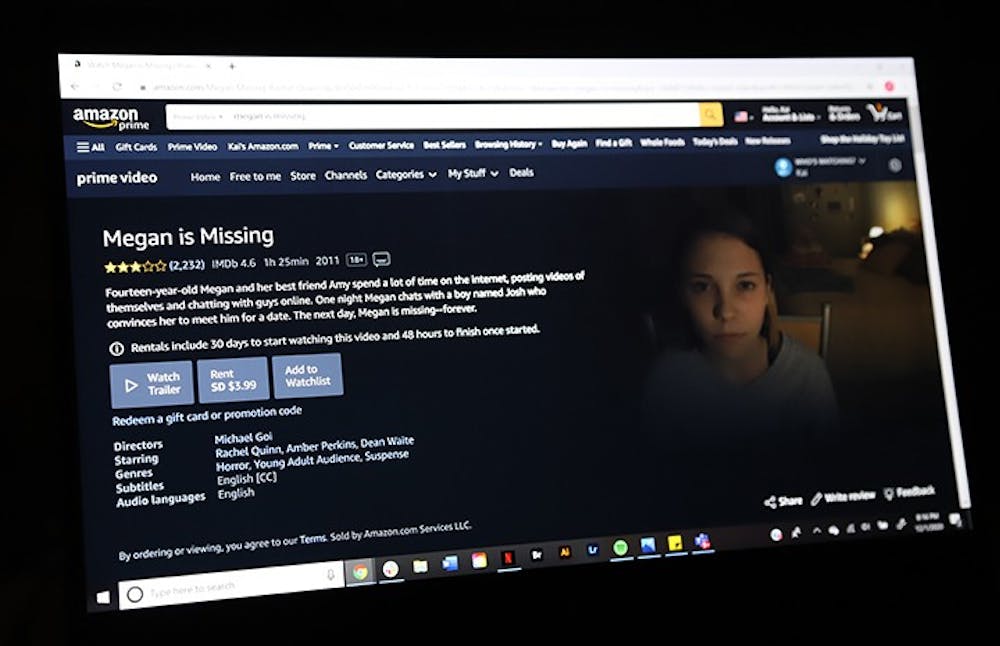A growing “trend” on TikTok has people traumatized, almost intentionally. Content creators are suggesting movies and documentaries that have left them speechless and scarred, some to a point of being banned from movie theaters. Of the recently talked about horror films, "Megan Is Missing" seems to be gaining the most popularity.
"Megan is Missing" is directed to evoke realism, thus bringing the fear from the screen to the minds of viewers. The film follows two teenage friends: 14-year-olds Megan Stewart and Amy Herman.
After chatting with a boy Megan met online named Josh, the two meet in person, and Megan is never seen again. While word spreads through the news and peers at school, the emphasis seems to be on the media story rather than tragic event, so Amy takes it into her own hands to investigate Josh and disappears just two weeks later.
The horror only starts there.
Once the film, released in 2011, started gaining attention again on TikTok, director Michael Goi took to Twitter to warn viewers of graphic photos and the last twenty-two minutes of the film, rightfully so.
In these photos, which we assume are real, Megan is bound, bloody and gagged with a terror in her eyes that will make your stomach knot. The photos are followed by a graphic and disturbing final 22 minutes following Amy's abduction which include a three-minute, one-shot rape scene, and that's when you start to understand this movie's reputation.
While the events in this movie are not actually true, the horrors illustrated in "Megan is Missing" are.
On the FBI’s website under the section labeled Violent Crimes Against Children News, you are able to track and view every case involving online predators, child sex crimes and the arrests of pedophiles on counts of child pornography, child abuse, sexual exploitation and more. There are 6,869 results as of Tuesday.
Online predators and internet sex crimes are a growing concern in the United States as the evolution of social media and its popularity becomes more favorable for adolescents to negate the awkwardness of flirting face-to-face.
While the film intentionally emphasizes the fear and brutality of online child sex crimes, it poses the threat of resurfacing viewers' past traumas, such as survivors of online child sex crimes, sexual assault and abuse.
For most, it is not necessarily that we enjoy being traumatized nor do we find any entertainment from such terrifying events, but because we are empathic beings, we strive to understand what the victim feels and what it is truly like to be in such a nightmare.
"Megan is Missing" was successful in this, and that is why it's so traumatizing and present in our lives.
Eighty-two percent of online sex crimes originate from social media sites as predators study their victims and learn about their interests so that they know how to exploit them. Seventy-five percent of these victims are girls, mainly between the ages of 13 and 15, and the vast majority of these cases end in their deaths.
Horrors similar to those depicted in "Megan is Missing" are seen in many cases.
On New Year’s Day of 2002, 13-year-old Alicia Kozakiewicz was abducted by a boy she’d been chatting with online for eight months.
She remembers him and what happened to her well, even after nearly two decades.
Alicia was locked away, raped, beat, tortured, starved and filmed. This horror was uploaded to an online streaming platform.
She was saved by a lesser monster, a pedophile viewer who recognized her in the video.
These traumas can be too much for a young girl to withstand even with her survival. When the horrors circulate online, it brings these traumas up from the grave, affecting more than just the victims — it affects the social media platform.
Kristin Helms was, unfortunately, one of these cases. When she was 14, Helms was enchanted by the kind words and loving support of a stranger on MySpace, Kiley Ryan Bowers, who was 29 at the time.
After talking for eight months, they met at a nearby motel where they would have sex together, just before Bowers ended their relationship. This led to Helms' distress and Bowers' arrest for having sex with a minor and the circulation of her photos. But, even with Bowers locked up, Helms' trauma led her to suicide.
Child victims of sexual abuse are stripped of their innocence well before their time, and "Megan is Missing" reflects this as viewers, assuming that the movie is a true story, are exposed to that same fear.
Though "Megan is Missing" has mixed reviews and perhaps scarred many viewers, it emulates a terrifying reality. A reality which is finding its ways to kids phones and lurking in the back of viewers minds. I don't know why we want to be traumatized, but it is exposing us to a difficult truth of the world.

